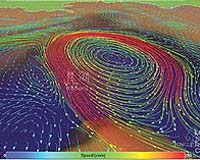 |
Bhopal, India (AFP) June 7, 2010 An Indian court sentenced the former top managers of the company blamed for the massive Bhopal gas leak 25 years ago to two years in prison Monday in the first convictions for the disaster. Seven people were found guilty in the court in Bhopal, capital of the central state of Madhya Pradesh, over the incident, which poisoned tens of thousands of people in the world's worst industrial accident. A lethal plume of gas escaped from a storage tank at the US-owned Union Carbide pesticide factory on December 3, 1984, killing thousands in the surrounding slums and residential area. The seven local managers were found guilty of criminal negligence, among them the ex-chairman of the Indian group, Keshub Mahindra, who is now chairman of truck group Mahindra & Mahindra, the Central Bureau of Investigation said. The guilty were all sentenced to two years in prison and ordered to pay a fine of 100,000 rupees (2,100 dollars) -- punishments denounced by victims and human rights' groups as too lenient. "For 25 years we waited and now after two hours this morning these men have effectively been set free," said Savitiri Mahe, standing outside court holding a picture of her daughter who died in the accident. Amnesty International's global issues director, Audrey Gaughran, said: "While the Indian employees have now been tried and convicted, the foreign accused have been able to evade justice simply by remaining abroad." All of the convicts were expected to appeal and were therefore not jailed immediately. The prosecution argued that there were design defects in the factory as well as other criminally negligent operational practices that were known to management but ignored for commercial reasons. The Union Carbide subsidiary, called Union Carbide India Limited (UCIL) and 51-percent owned by the US group at the time of the accident, was also convicted and ordered to pay a fine of 500,000 rupees. Warren Anderson, the American then-chairman of the Union Carbide parent group, was among the accused but was not named in the verdicts after the Bhopal court declared him an "absconder". India has sought his extradition from the United States since 1993. The company executives were originally charged with culpable homicide but, to the outrage of survivors and victims, the Supreme Court reduced the charges in 1996 to death by negligence with maximum imprisonment of just two years. Outside court on Monday, victims and members of human rights groups anxiously waited. Some shouted that the verdict was an "insult", others screamed "hang the guilty!" "Justice has been delayed and denied," read one placard. Government figures put the death tollat 3,500 within three days of the leak, but independent data by the state-run Indian Council of Medical Research (ICMR) puts the figure at between 8,000 and 10,000 in the same period. The ICMR has said that until 1994, 25,000 people also died from the consequences of gas exposure, with victim groups saying many still suffer the effects. Dow Chemical bought Union Carbide in 1999 but says all liabilities related to the accident were cleared in a 470-million-dollar out-of-court settlement with India's government in 1989. In a statement Monday, the group said that "all the appropriate people from UCIL -- officers and those who actually ran the plant on a daily basis -- have appeared to face charges." It added that officials from the Union Carbide parent group were not part of the case and were not subject to the jurisdiction of the Indian court. Survivors remember their eyes grew huge and red after the leak and they began frothing at the mouth and vomiting. Many recall hundreds of dead lying in the streets. Government statistics compiled after 1994 concluded that at least 100,000 people living near the factory were chronically sick, with more than 30,000 residing in areas with contaminated water. A study last year by the British-based Bhopal Medical Appeal said the shanty towns surrounding the site were still laced with lethal chemicals that were polluting groundwater and soil, causing birth defects and illnesses. Prime Minister Manmohan Singh has described Bhopal as a tragedy that "still gnaws at our collective conscience" and has vowed to tackle the issues of drinking water and site decontamination.
Share This Article With Planet Earth
Related Links Our Polluted World and Cleaning It Up
 Tourism-dependent Florida braces for hit as next Gulf oil front
Tourism-dependent Florida braces for hit as next Gulf oil frontPensacola, Florida (AFP) June 6, 2010 The welcome sign to this sugar-white sand beach resort Sunday signaled the unwelcome arrival of the Gulf's oil spill eastern front: "Do not pick up oil balls, let the clean-up crew do it." Despite the caution, Illinois tourists Taggert and Tammy Schakelford couldn't help themselves from strolling the water's edge, picking up pea-sized globules of glistening black oil and depositing them in a ... read more |
|
| The content herein, unless otherwise known to be public domain, are Copyright 1995-2010 - SpaceDaily. AFP and UPI Wire Stories are copyright Agence France-Presse and United Press International. ESA Portal Reports are copyright European Space Agency. All NASA sourced material is public domain. Additional copyrights may apply in whole or part to other bona fide parties. Advertising does not imply endorsement,agreement or approval of any opinions, statements or information provided by SpaceDaily on any Web page published or hosted by SpaceDaily. Privacy Statement |